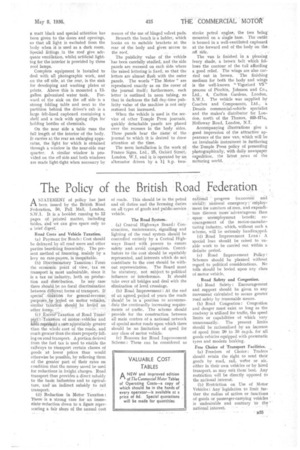The Policy of the British Road Federation
Page 49

If you've noticed an error in this article please click here to report it so we can fix it.
ASTATEMENT of policy has just been issued by the British Road Federation, 50; Pall Mall, London, S.W.1. It .is. a booklet running to 12 pages of printed matter, including tables. and,' we can give space only to a brief digest.
Road Costs and Vehicle Taxation.
(a) Payment for Roads : Cost should be defrayed by all road users and other parties benefiting financially. The present method of financing, mainly by a levy on rate-payers, is inequitable.
(b) Discriminatory Taxation: From the economic point of view, 'tax on transport is most Undesirable, since it is a tax on industry, both on produc tion and distribution. In any case there should be no fiscal discrimination between different forms of transport. If special' tai'atiOn for general revenue purpoSes, be levied on motor vehicles, similar taxation should be levied on other forms. • • "` •
(C): txcles'Taxation of Road Trans prt:.!Takatipit of Motor vehicles and taelSropri5Wa slain appreCiably greater than the whole cost of the roads, and much greater than the share properly falling on road transport. A portion derived from the fuel tax is used to enable the railways to transport certain classes of goods at lower prices than would otherwise be possible, by relieving them of the greater part of their rates on condition that the money saved be used for reductions in freight charges. Road transport thus provides a direct subsidy to the basic industries and to agriculture, and an indirect subsidy to rail transport.
(d) Reduction in Motor Taxation: Thereis a strong case for an immediate.reduction down to a fignre representing a fair share of the annual cost of roads. This should be in the petrol and oil duties and the licensing. duties on all types of goods and public-service vehicle.
The Road System..
(a) Central Highways Board : 'Construction, maintenance, signalling and lighting of the road system should be controlled entirely by a Central Highways Board with powers to ensure safety .andavoid congestion. Contributors tothe cost should be equitably represented, and interests which do not contribute to the cost should be without representation. The Board must be statutory, not subject to political
influence or interference. It should take over all bridges and deal with the elimination of level crossings.
(b) Road Improvement: At the end of an agreed], period of years the roads Should be in aposition to accommodate the continually increasing requirements of traffic. The scheme should provide for the construction between all main centres of a national network of special motor roads upon which there should be no limitation of speed for any class of motor vehicle.
(c) Reasons for Road Improvement Scheme: These can be considered as
natiOnal progress (economic and secial); national emergency ; .enaploy, ment for numbers of men, and-expenditure thereon more advantageous than upon. unemployment benefit; encouragement of the motor-manufacturing industry, which, without such a scheme, will be seriously handicapped.
(d) Road Improvement Loan : A special loan should be raised to enable work to be carried out within a definite period.
(e) Road Improvement Policy: Schemes should be planned without regard to political considerations. No tolls should be levied upon any class of motor vehicle.
Road Safety and Congestion.
(a) Road Safety: Encouragement and support should be given to any movement calculated to secure greater road safety by reasonable means.
(b) Road Congestion : Congestion and danger mustexist so long as the roadway is utilized for traffic, the speed limits or capabilities of which vary unnecessarily. The present limits should he rationalized by an increase of speed from 20 to 30 m.p.h. for all goods vehicles equipped with pneumatic tyres and modern braking.
Free Choice of Transport Facilities.
(a) Freedom of Choice : Traders should retain the right to send their goods by road, rail, water or air, either in their own vehicles or by hired transport, as may suit thembest. Any restriction will be directly opposed to the national interest.
(b) Restriction on Use of Motor Vehicles: Any legislation to limit further the radius of action or functions of ,goods or passenger-carrying vehicles is undesirable and contrary to die national interest:




























































































